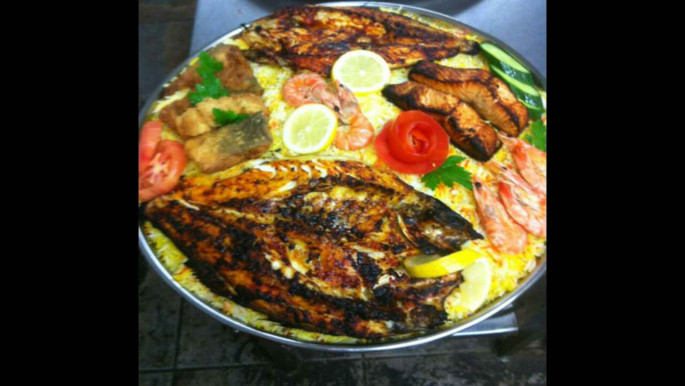The Ambassador: True Yemen on a (gigantic) plate
I have been waiting to try Yemeni food for months. In a place like London – host to every imaginable cuisine from around the world – it shouldn't be that hard, right?
Wrong. A quick Google search and you'll find a surprising lack of Yemeni restaurants. Lebanese? Plenty. Even Bahrain is represented on Edgware Road, the capital's Middle Eastern food hotspot. But Yemeni? Almost none in sight.
Perhaps Yemeni cuisine is not so mouth-watering? When I mentioned this possibility to a Yemeni colleague, I was instantly stared into silence.
"Yemeni food is good, and if you want it, you'll find it, but not in the capital," she said rather prophetically, and I accepted the challenge.
And so I set off to Liverpool, home to the biggest and oldest Yemeni community in the UK to try this hard-to-find cuisine.
The first Yemenis arrived here on cruise ships as early as 1898, and they now form the city's largest Arabic community. Where better than here to taste authentic Yemeni cuisine, I thought?
My local sources said that for a true taste of Yemen, I must try The Ambassador – a little restaurant tucked away in the city's multicultural West End. So after a Saturday morning of filming, I sat there for lunch with a friend, hungry and determined to tuck into this elusive cuisine.
 |
|
| The Ambassador's choice of sharing platters includes grilled fish and seafood |
The Ambassador is a very modestly furnished Arabic restaurant and take away, but the food – a wide ranging menu from Lebanese to pizzas – is cooked with utmost care and expertise by a Yemeni chef.
We steered clear of the pizzas and the Lebanese menu options. I had come this far for a true Yemeni experience, so I started with a cup of Maraq – the traditional, slow-cooked meat-based soup, spiced with cinnamon, cumin, coriander and cardamom and refreshingly served with a slice of lemon for extra taste. It went down like hot tea on a cold morning.
My flexitarian friend ordered hummus – slightly too tahini-intense for my taste – and a tajine of stewed vegetables, which was plenty to satisfy his five-a-day.
Lured by my starter, and by the waiter who was eager to feed us as if there was no tomorrow, for our main we ordered a shared platter and pride of the restaurant: the lamb shoulder.
Lamb Kabsa is a specialty of the Arab Peninsula, involving slow cooked lamb served on a bed of rice and roasted potatoes, spiced with tomato and a mild mix of spices, and traditionally served with "shattah" – a chilli-based, tear-inducing hot sauce.
 |
Lamb Kabsa is a specialty of the Arab Peninsula, involving slow cooked lamb served on a bed of rice and roasted potatoes, spiced with tomato and a mild mix of spices, and traditionally served with "shattah" – a chilli-based, tear-inducing hot sauce |  |
Liverpool has more to offer than Beatles memorabilia and scouse stew, let me tell you. The lamb was perfectly roasted – just slightly burnt on the outside, and so tender that it easily came apart when we attacked it with our right hands as tradition requires in Yemen, and which we promptly obliged.
The rice and potatoes were very tasty, albeit only slightly overcooked, and perhaps colder than what I would have hoped. To be truly authentic the potatoes shouldn't have been there, but they were a nice addition, as was the fresh complimentary salad which helped us with downing the enormous platter.
It could have easily fed five people, but we did not desist. At the end, when all bones were cleaned and we were on our way to a food coma, I still had space to try Bint al-Sahn, or the beauty of the table as it is called – the traditional Yemeni sweet dish which is served in the middle of a meal.
It is similar to the Turkish borek, but with a hollow centre. Its layers of buttery pastry are simply topped with honey and Nigella seeds. Its preparation is very lengthy. Yemeni women, I was told, get up at five in the morning to prepare the beauty of the table. And it really is a beauty – or so I anticipated.
But in the Ambassador the choice of desserts was limited to the Yemeni Fatat Tamer – breadcrumb mixed with dates and butter, and the obvious Baklava. I was disappointed, but in truth we did not have space for anything else except a freshly prepared mango lassi, and a tea.
The waiter looked so satisfied with having calmed our appetite that he didn't even want my meagre tip on what was a modest bill.
We left the Ambassador heaved down by a gargantuesque meal, but lifted in spirit by Arab hospitality, and happy at having fulfilled our mission: Yemeni food exists, and it is good. It is just a question of finding it.
Halal: Yes
Alcohol served: No
Follow the Ambassador on Facebook: The Ambassador





 Follow the Middle East's top stories in English at The New Arab on Google News
Follow the Middle East's top stories in English at The New Arab on Google News


